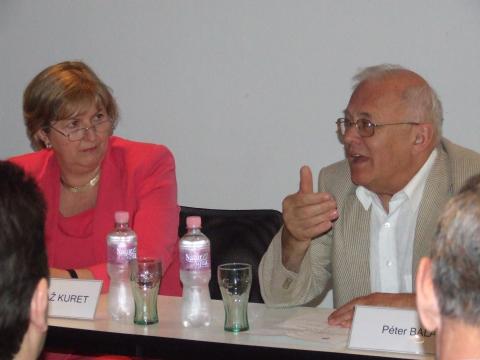Event Report - “The 20th Anniversary of Slovenian Independence"

In order to commemorate twenty years of independence of the Republic of Slovenia, the Center for EU Enlargement Studies (CENS) and the Slovenian Embassy to Budapest organized a public lecture on 1 June 2011 entitled “The 20th Anniversary of Slovenian Independence.” The lecture was delivered by Ambassador H.E. Darja Bavdaž Kuret to a distinguished group of diplomats, ambassadors, students and university professors. The Ambassador touched upon a large number of issues ranging from the history of Slovenia, dissolution of the former Yugoslavia, Slovenian path toward the independence, to the current burning issue of Ratko Mladic’s arrest.
Petér Balázs, Director of CENS, started his opening speech by welcoming the audience and highlighting Slovenian’s great progress in the last twenty years. Balázs expressed his personal interest in learning more about the three matters: twenty years of Slovenian independence; experiences of the first Slovenia’s Presidency of the Council of the EU in 2008; and Ambassador’s personal views on the arrest of Ratko Mladic, Bosnian Serb General indicted almost 16 years ago for the 1995 genocide in Srebrenica and other war crimes.
Darja Bavdaž Kuret began the lecture by providing a brief outline of the history of Slovenia, reminding the audience of some dates crucial for the establishment of today's modern country. She continued by speaking about the dissolution of Yugoslavia which was highly influenced by Tito’s death and the fact that the former country lost its chief leader. The mid-1980s in Slovenia were the time of establishing various democratic movements whose actions and agenda resulted in Slovenia’s independence approximately ten years later. The two main challenges the newly-established country had to cope with were abruptly decreased economy and uncertainty if the rest of the world would recognize it. Bavdaž Kuret continued by pointing out the positive decisions undertaken by the Slovenian leadership which enabled the country to later mark a great progress within the EU. She mentioned that first, the road for future was clearly set up; second, it was decided to accept the values shared by the EU; third, foreign policy goals were explicitly set; fourth, measures to put finances and economy on the right track were defined. Bavdaž Kuret emphasized that the Western Balkan was not Slovenian foreign policy priority, but to join the EU and NATO first.
The Ambassador also shared the Slovenian experiences of the EU Presidency, describing it as extremely challenging due to the fact that Slovenia was the first among new member states to take over the Presidency. “Only when you are a leader you can clearly see things and set yourself into the heart of the EU”, said Bavdaž Kuret. She emphasized that the 2008 Slovenian Presidency is generally regarded as successful. The Ambassador also welcomed the arrest of Ratko Mladic and regarded it as a turning point which will relax the relations with Serbia. Bavdaž Kuret concluded by stating that Slovenia is a great supporter of enlargement and that there is no other alternative than the EU.
The lecture was followed by a question and answer session touching upon a large number of issues ranging from the privatization process in Slovenia, position of minorities to opportunities for young generations.
